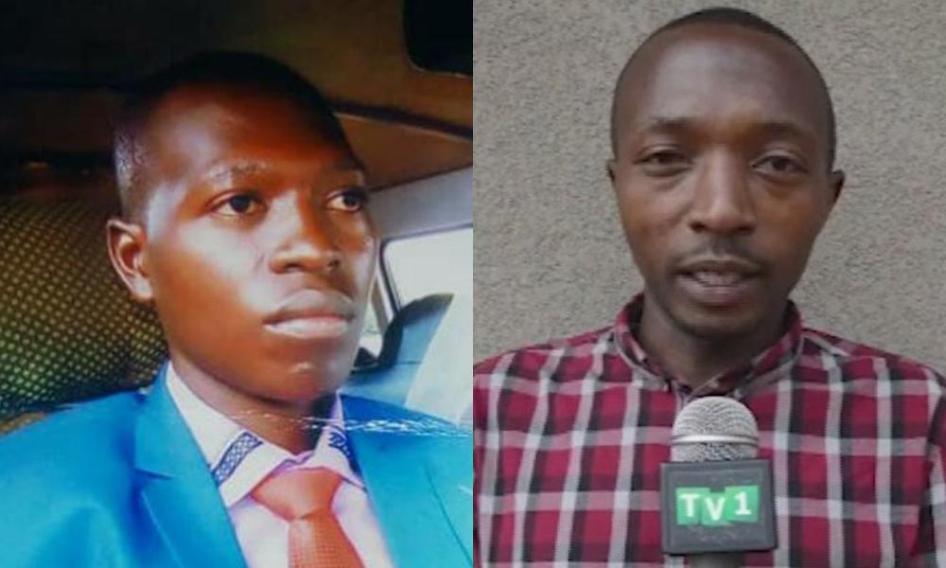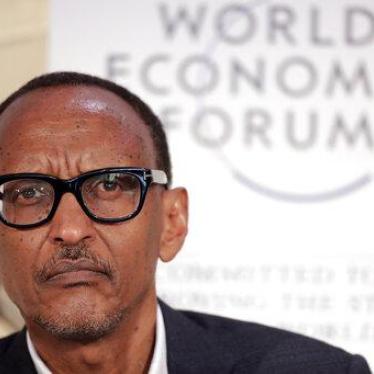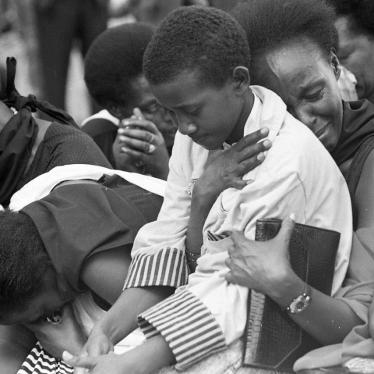(Nairobi) – A journalist and an opposition member from Rwanda are still missing one month after disappearing in separate incidents. Their loved ones have not heard from them, and the authorities have revealed nothing about investigations.
Eugène Ndereyimana, an opposition member with the unregistered Forces démocratiques unifiées (FDU)-Inkingi party was reported missing by his colleagues on July 15, 2019 after he failed to arrive for a meeting in Nyagatare, in Rwanda’s Eastern Province. His colleagues, who were in contact with him while he was travelling, say he never arrived. In an apparently unrelated case, Constantin Tuyishimire, a journalist with TV1 Rwanda who covers northern Rwanda, was reported missing on July 16 while he was supposed to be on a reporting trip to Gicumbi District, people close to him told Human Rights Watch.
“These cases are the latest in a long line of suspicious disappearances, politically motivated arrests, and unlawful detentions in Rwanda, especially of suspected government opponents and critics,” said Lewis Mudge, Central Africa director at Human Rights Watch. “The authorities should conduct transparent and credible investigations into the disappearances and hold those responsible to account.”
It is unclear whether Tuyishimire’s disappearance was related to his work or Ndereyimana’s to his political activity. The Rwanda Investigation Bureau informed TV1 Rwanda on July 23 that they believed Tuyishimire had probably fled to Uganda due to unpaid debts, although people close to him have not been able to confirm this, nor have they heard from him.
Journalists in Rwanda are often unable or unwilling to engage in investigative reporting on politically sensitive issues because of intimidation, threats, and prosecutions. In one case, John Ndabarasa, a journalist who disappeared in August 2016, resurfaced in Kigali on March 6, 2017, more than six months later. In a story that raised suspicion he told the media that he had fled the country but decided to return. Human Rights Watch has documented numerous cases in Rwanda in which former detainees were forced to make false claims following months of illegal, secret detention and torture.
Politically motivated disappearances are not new in Rwanda, and they are rarely the subject of fair and transparent investigations. An FDU-Inkingi statement said that the party’s president, Victoire Ingabire, and Ndereyimana’s wife had informed the Investigation Bureau of his disappearance 48 hours after he went missing, on July 17. Since then, they have not received any updates on the investigation.
Ndereyimana’s disappearance comes just five months after the death in mysterious circumstances of Anselme Mutuyimana, an assistant to Ingabire. The party said that Mutuyimana’s body was found in a forest in northwestern Rwanda showing signs of strangulation. The Investigation Bureau told Reuters that it had opened an investigation, but it has not made any findings public or shared them with Mutuyimana’s colleagues. Mutuyimana had just been released from prison, after serving a six-year sentence with Sylvain Sibomana, the party’s secretary-general, for organizing a meeting in 2013.
Human Rights Watch wrote to the Investigation Bureau spokesperson on August 5 requesting information about the investigations into Ndereyimana and Tuyishimire’s disappearances and Mutuyimana’s death but did not receive a response.
Ingabire was sentenced to 15 years for conspiracy to undermine the government and genocide denial after she tried to contest the 2010 presidential elections. She served eight years before her release in September 2018, when President Paul Kagame pardoned more than 2,000 prisoners.
In October 2018, the deputy leader of the FDU-Inkingi, Boniface Twagirimana, “disappeared” from his prison cell in Mpanga, southern Rwanda. He had been charged alongside several other party members with state security offenses and was last seen in custody. Rwandan authorities are responsible for his presumed enforced disappearance and for whatever has happened to him since.
In March 2016, Illuminée Iragena, a political activist and FDU-Inkingi member, was reported missing, most likely forcibly disappeared in unacknowledged government detention. People close to Iragena said that after she disappeared, they had received messages, allegedly from Iragena, saying she was going abroad. Iragena’s family does not believe that she has left the country and fear she is dead.
In a widely shared France 24 interview, Kagame recently dismissed the European Union’s 2018 report of “serious civil and political rights violations” in Rwanda as “ridiculous” and brushed aside questions about critics being killed, physically attacked, jailed, silenced, or forced into exile in the period before the 2017 presidential election.
Following that election, Human Rights Watch reported a worrying pattern of abuses against political opponents. Since then, Human Rights Watch has documented the government’s persistent efforts to silence critics and perceived political opponents with arbitrary arrests, threats, and enforced disappearances.
It is essential for the rule of law in Rwanda and to ensure proper protection of the rights to life, liberty and security, to carry out investigations capable of identifying those responsible for any wrongdoing for all such incidents, Human Rights Watch said.
“It is neither normal or acceptable that journalists and political opponents can disappear or end up dead, as happens in Rwanda,” Mudge said. “The deliberate chilling message this sends to anyone brave enough to question or report on the status quo in Rwanda needs to end, and that starts with authorities conducting credible investigations into these incidents.”










